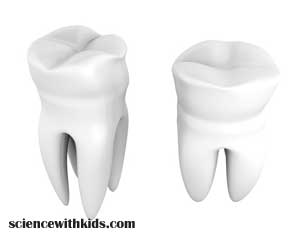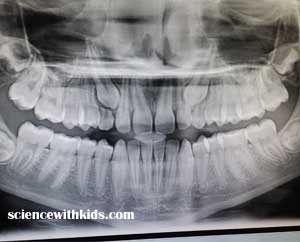Facts about Teeth
Posted by Admin / in Science Facts

Learn some interesting facts about teeth.
Interesting Facts about Teeth
- Teeth have the hardest substance in our body. It is called enamel. Enamel coats the outer surface of our teeth to help protect them and give them strength.
- Over time, the enamel on our teeth loses calcium and phosphate.
- Saliva in our mouth contains new calcium and phosphate ions that replace the ones our teeth loose. Calcium and phosphate in our saliva comes from the foods we eat. Milk, green vegetables, beans and fish all contain calcium. Cheese, milk, fish, and tofu all contain phosphate to help tooth enamel.
- There is also bacteria in our mouth from food and other things we put in our mouth.
- Bacteria can attach itself to the enamel on our teeth and create a substance called plaque.
- New bacteria can combine with the plaque to create an acid that can destroy the protective enamel on our teeth.
- Brushing teeth and flossing regularly along with easting a healthy diet with calcium and phosphate helps destroy the bacteria that damages tooth enamel.
- Dentists use x-rays to look inside teeth to help them find cavities and see if teeth are growing properly.

Kids Tooth Facts
- People grow 2 sets of teeth over their lifetime. In early childhood, kids grow 20 teeth. There are 10 teeth on the top row and 10 teeth on the bottom row. These teeth are called baby teeth, primary teeth or milk teeth.
- Typically starting after the age of 5 permanent teeth push out the baby teeth. When all teeth grow in properly, an adult has 32 teeth.
- The last teeth to grow in are the back molars. The second set of molars normally grows in around the age of 11 or 12. The third row of molars grows in between the age of 17 and 21. These last two molars are also known as wisdom teeth.
- It is rare, but some babies are born with teeth. Teeth present at birth are known as natal teeth. Natal teeth are typically removed soon after the baby is born to reduce risk to the baby.
